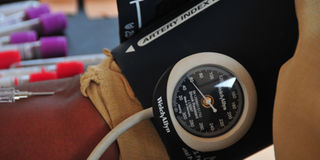Is your Senior One child in good health?

Taking your child for medical check-up before they go back to school will help them keep healthy while at school. Photo by Faiswal Kasirye.
What you need to know:
In most cases, illnesses are the ones that make our children lag behind at school. So, before you take your child to school, dropping by a hospital for a general check-up and knowing the important tests to take, will save you a lot of worry.
When I was in high school, there was a certain girl that I used to admire so much. I always wanted to be like her not for one thing, but for countless traits. First of all, she was the most popular girl in the school and her name never missed on the list of the top three students in her class despite the fact that she came from a very poor family.
Secondly, she was never found in any mistake in short, she was a well-disciplined girl and she won the head teacher’s heart as the favourite student. But one day she shocked the entire school when she did the most unexpected incident. Beryl* was caught red-handed by several students trying to abort a seven-month-old pregnancy in the wee hours of the night.
The school nurse and driver were called immediately to rush Beryl to the nearest hospital but since she had lost so much blood in the process of abortion, the little baby was stillborn, and Beryl almost lost her life. It was a very sad moment for the school and after the incident, my school started a routine check-up programme for pregnancy for each student and advised parents to also take their children for other tests before the new term session.
The excuses parents give
It is quite unfortunate that many parents always send back their children to school without taking them for any health check-up. Senior One students are reporting to school today but several times parents always bring up an excuse of either lack of time or money to take their children for health tests.
“My three children are in a boarding school but I have never bothered to take them for a check-up during holidays. I only rush them to the hospital if they pose any unusual symptoms and I know they are at risk.
“It is a bit expensive for an ordinary person like me to take all my children at once to the hospital because first, I will have to pay consultation fee for the three then pay for each test and finally for medicine. I don’t have medical insurance so I can’t afford to take them for health test,” explains Linet Meeme.
Meeme says she always counsels her 14-year-old daughter in Senior Two about the dangers of early pregnancy and its consequences thus she believes she cannot engage in early sexual practices.
However, Dr Catherine Nyangabyaki, the head of the paediatric department at Nsambya hospital, says good health starts with regular check-ups. “A health check-up is an assessment of a person’s physical health and general wellbeing. This includes height, weight, dental, blood test, hearing and sight to ensure that the child is growing well. General check-up ensures your child is healthy, fit and ready to learn when they start school. Regular check-ups help to identify health problems before they become serious thus it is important for children to have regularly scheduled checkups, beginning shortly after birth and lasting through the teen years,” says Nyangabyaki.
Children who have certain infectious diseases need to stay away from school until they have completely recovered. This is not only because they need time and lots of rest in order to fully recover from their illness, but because infectious diseases are spread by contact with others who are affected.
“You may have a young child in a boarding school yet she or he is suffering from a non-communicable illness which needs care. Or you may have an older child who has more responsibility for his care but still needs guidance. Either way, you want to feel that your child is in safe hands while at school and make sure that your child is not treated differently,” she narrates.
Curbing contagious diseases
Many schools have set up missions, visions and rules but they have overlooked to form health regulations about when sick children should report back to school after contracting certain diseases to avoid any future epidemic of these illnesses. Exclusion of sick children and staff from schools and child care centres is also one of the most important ways to prevent the spread of contagious diseases.
“Unlike abroad, it is unfortunate that here in Uganda and several African countries that our governments have not set any standardised check-up routine for children. It is necessary for each and every school to have a qualified nurse because apart from all those illnesses, other unpredictable cases may arise like convulsion. A visit to the paediatrician is recommended for any child to review all vaccinations and make sure his or her health is safe,” she adds.
Parents should also note that taking their children for immunisation and vaccines is as important as feeding them on a balanced diet. Children suffering from non-communicable diseases such as asthma, sickle cell disease, diabetes and heart disease, and also those with HIV/Aids, should strictly get all vaccinations without missing them since their immunity is not very strong.




